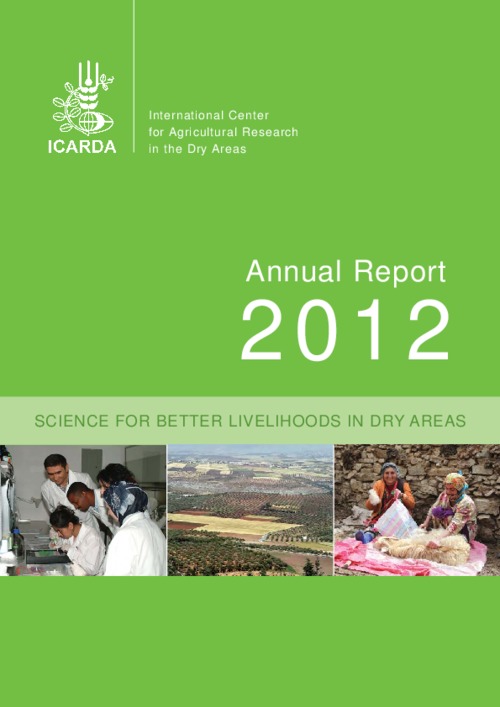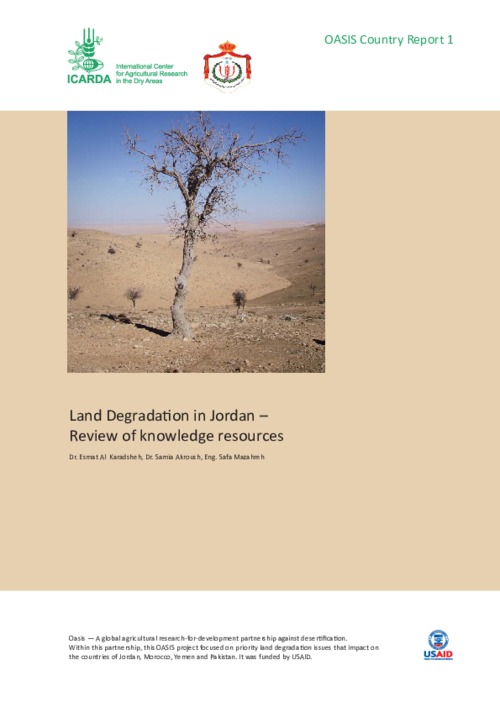Location
The International Center for Agricultural Research in the Dry Areas (ICARDA) was established in 1977. It is one of 15 such centers supported by the CGIAR. ICARDA’s founding mandate to promote agricultural development in the dry areas of developing countries remains highly relevant today.
ICARDA works with a tight focus on the problem-solving needs of resource-poor farmers, achieving this through the in-field delivery of its research outputs. Although global food production has increased by 20 per cent in the past decade, food insecurity and poverty remain widespread, while the natural resource base continues to decline.
International research centers such as ICARDA, which have helped drive previous improvements, continue to deliver new technologies to support sustainable growth in agriculture, and crucially, to work with a wide range of partners to accelerate the dissemination of these technologies.
ICARDA’s biggest strength is its staff – 600 highly skilled men and women from 32 countries. Our research and training activities cover crop improvement, water and land management, integrated crop-livestock-rangeland management, and climate change adaptation.
Other interventions include:
- Water harvesting - supplemental irrigation and water-saving irrigation techniques
- Conservation agriculture methods to reduce production costs and improve sustainability
- Diversification of production systems to high-value crops – horticulture, herbal and medicinal plants
- Integrated crop/rangeland/livestock production systems including non-traditional sources of livestock feed
- Empowerment of rural women – support and training for value-added products.
The ICARDA genebank holds over 135,000 accessions from over 110 countries: traditional varieties, improved germplasm, and a unique set of wild crop relatives. These include wheat, barley, oats and other cereals; food legumes such as faba bean, chickpea, lentil and field pea; forage crops, rangeland plants, and wild relatives of each of these species.
ICARDA’s research portfolio is part of a long-term strategic plan covering 2007 to 2016, focused on improving productivity, incomes and livelihoods among resource-poor households.
The strategy combines continuity with change – addressing current problems while expanding the focus to emerging challenges such as climate change and desertification.
We work closely with national agricultural research systems and government ministries. Over the years the Center has built a network of strong partnerships with national, regional and international institutions, universities, non-governmental organizations and ministries in the developing world and in industrialized countries with advanced research institutes.
THE ‘DRY AREAS’
Research and training activities cover the non-tropical dry areas globally, using West Asia, North Africa, Central Asia and the Caucasus as research platforms to develop, test, and scale-out new innovations and policy options.
Dry areas cover 41 per cent of the world’s land area and are home to one-third of the global population. About 16 per cent of this population lives in chronic poverty, particularly in marginal rainfed areas. The dry areas are challenged by rapid population growth, frequent droughts, high climatic variability, land degradation and desertification, and widespread poverty. The complex of relationships between these challenges has created a "Poverty Trap."
Members:
Resources
Displaying 331 - 335 of 431ICARDA Annual Report 2012
For ICARDA, 2012 has been a time of change and evolution. We have been busy tackling the many issues of dryland agriculture and global food production against a backdrop of focusing our efforts as a force for change for people living in the world's drylands and our areas of scientific expertise.
Land Degradation in Jordan – Review of knowledge resources
This publication is a baseline assessment reviewing the current knowledge of land degradation in the rangelands of Jordan - known as Badia - with a special focus on its causes. It includes a review of current legislation and on-going initiatives to combat land degradation, along with an analysis of the main constraints limiting their effectiveness.
Combating Land degradation in Yemen
The purpose of this document is to review the current land characteristics and use status in Yemen as well as agricultural policies and institutional efforts to combat land degradation in the country.
A Review of Available Knowledge on Land Degradation in Morocco
This publication reviews the historical and current literature on land degradation in Morocco and
presents the results of a case study in the western part of the country. It is intended as a reflection on
the baseline causes for land degradation, so contributing to the development of enabling agricultural
policies and the associated institutional dynamics that are needed to overcome degradation problems.
This report identifies crucial policy inconsistencies and dysfunctions that were, so far, ineffective in
Comparing Two Methods of Soil Data Interpretation to Improve the Reliability of Land Suitability Evaluation
Sustainable management of limited land and water resources is urgently needed to meet the increasing demand for food and to protect the environment. Land suitability analysis is a prerequisite in assessing and proposing sustainable land use alternatives for an area. Soil data are usually available at different levels of detail and stored in various forms, usually soil maps and/or soil observations. Soil data interpretation methods control the reliability of land suitability evaluation results.







